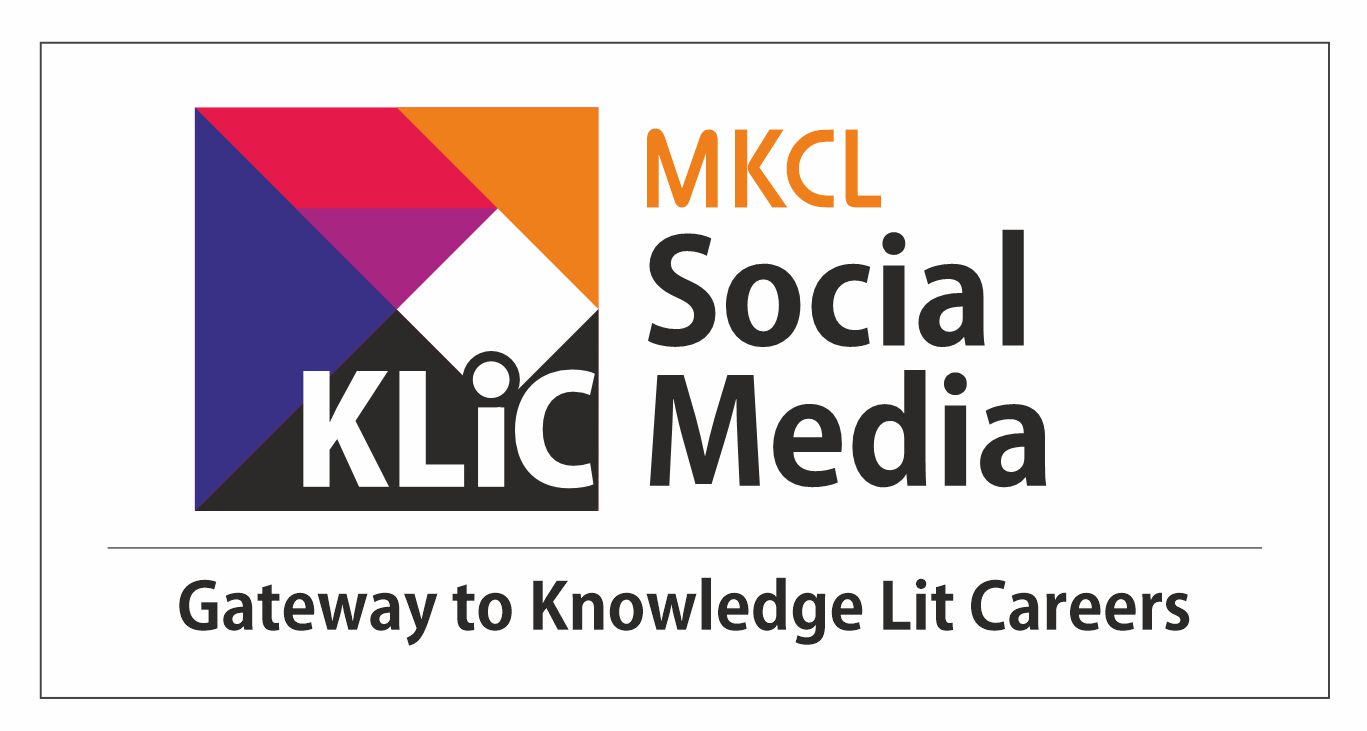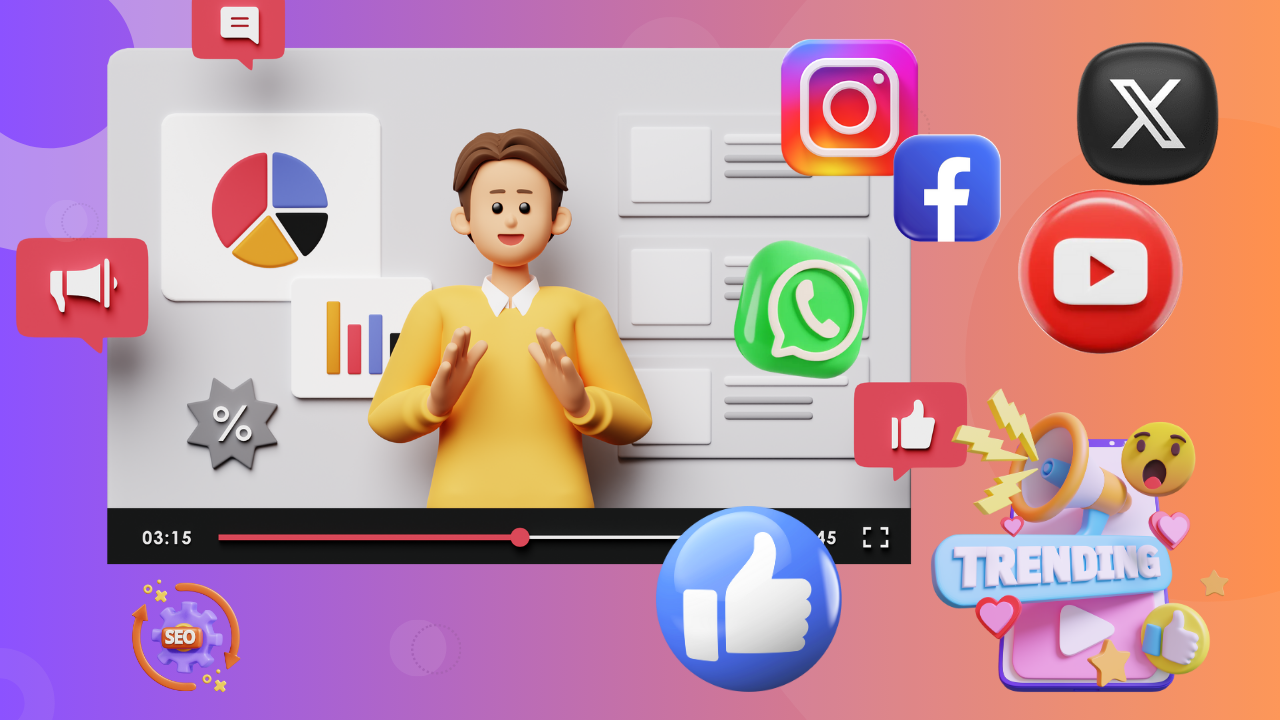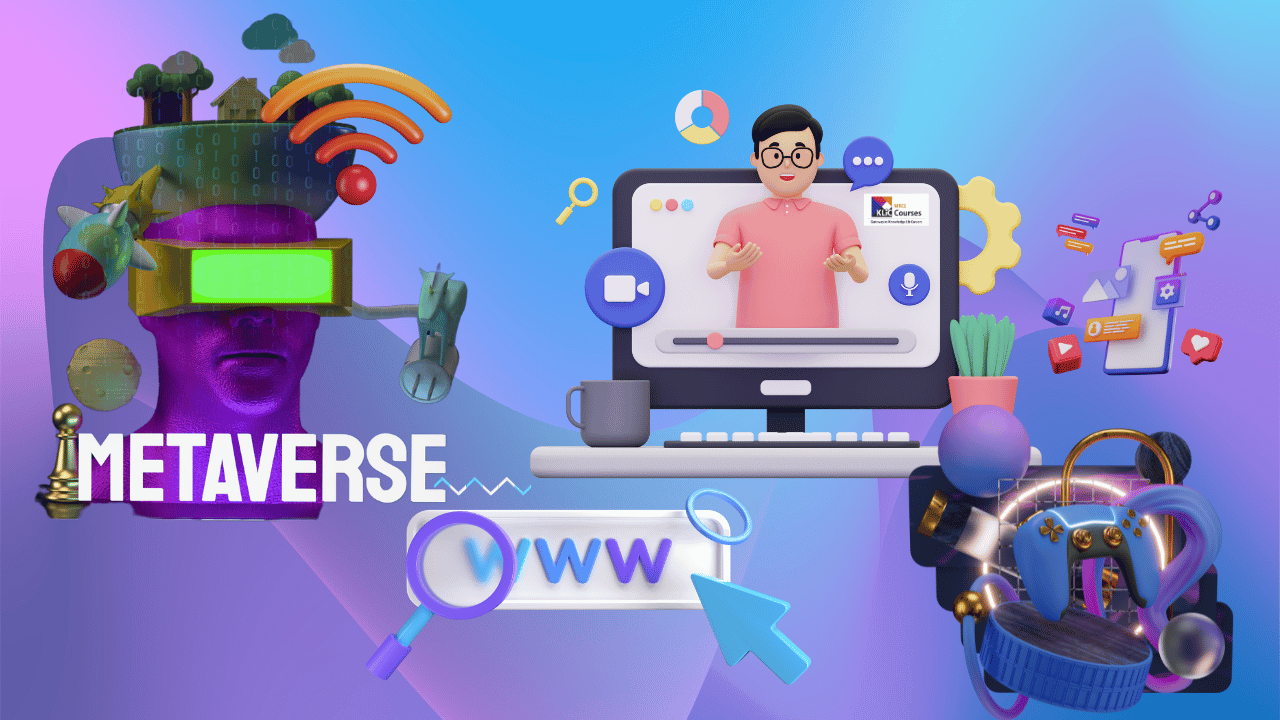- Aspiring Digital Marketers: Individuals aiming to build a career in digital marketing, focusing on social media platforms.
- Business Owners and Entrepreneurs: Those looking to promote their products or services online to reach a broader audience.
- Marketing Professionals: Individuals seeking to enhance their skill set by incorporating social media strategies into their marketing plans.
- Students and Graduates in Marketing and Business: Learners pursuing studies in marketing or business who wish to gain practical knowledge in social media marketing.
- Freelancers and Consultants: Professionals offering marketing services who want to expand their expertise in social media marketing.
- Content Creators and Influencers: Individuals aiming to grow their online presence and engage effectively with their audience.
- Non-Profit Organizations: Staff and volunteers looking to leverage social media to increase awareness and support for their causes.

KLiC Social Media Marketing
In this Social Media Marketing course, you’ll explore key concepts and the importance of digital marketing in today’s business landscape. You’ll learn to identify various channels, compare traditional and digital methods, and understand SEO's role in visibility. The course covers effective social media strategies, common pitfalls, and emerging trends like short-form videos. By the end, you'll be equipped to enhance brand awareness and customer engagement through innovative and ethical marketing practices.
Who Should Join
What you'll learn ?
At the end of this course, learners will be able to:
- Interpret the significance of digital marketing in the context of traditional marketing practices
- Illustrate the various types of digital marketing channels and their respective advantages and disadvantages
- Paraphrase the role of search engine optimization (SEO) in improving website visibility and ranking on search engine results pages
- Estimate the impact of content marketing and social media marketing strategies
- Defend the importance of influencer marketing and marketing automation in contemporary digital marketing strategies
- Compare different methods for measuring the effectiveness of email marketing campaigns and mobile marketing initiatives
- Review case studies of successful viral marketing campaigns and analyze their key components for replicable success
- Rewrite outdated social media marketing practices to align with current trends and consumer preferences
- Construct a comprehensive social media marketing strategy
- Estimate the potential ROI of integrating online and offline marketing strategies for brand promotion and customer engagement
- Appraise the ethical considerations and regulatory compliance requirements in digital marketing practices
- Combine psychological insights into user behavior with creative content strategies
- Solve common challenges in social media marketing, such as negative feedback management, over-promotion, etc.
- Interpret the role of social media content calendars and their importance in strategic content planning and scheduling.
- Illustrate proficiency in creating visually appealing social media posts using ChatGPT and Canva to enhance engagement and reach.
- Paraphrase the key elements of effective Facebook marketing strategies, including Messenger Kids, Gaming, and Marketplace listings.
- Estimate the impact of different types of social media advertising campaigns on audience engagement and conversion rates.
- Defend the ethical considerations and legal implications of social media marketing practices, including copyrights and fair use.
- Compare the effectiveness of organic versus paid marketing tactics across various social media platforms, such as Facebook, Instagram, and Twitter.
- Review the process of analyzing social media analytics and insights to inform marketing strategies and optimize performance.
- Rewrite social media marketing strategies to incorporate best practices for maximizing reach, engagement, and conversion.
- Construct comprehensive LinkedIn marketing strategies to leverage the platform for professional networking and business growth.
- Estimate the effectiveness of influencer marketing campaigns and micro-influencer collaborations in reaching target audiences and driving conversions.
- Appraise the benefits and challenges of social commerce and shoppable posts in driving sales and enhancing user experience.
- Combine various social media optimization techniques for different devices to ensure consistent and engaging user experiences across platforms.
- Solve technical challenges related to podcast production, distribution, and promotion to maximize reach and audience engagement.
Certification
- MKCL provides certificate to the KLiC learner after his/her successful course completion.
Academic Approach
The academic approach of the courses focuses on the “work-centric” education i.e. begin with work (and not from a book!), derive knowledge from work and apply that knowledge to make the work more wholesome, useful and delightful. The ultimate objective is to empower the Learner to engage in socially useful and productive work. It aims at leading the learner to his/her rewarding career as an employee or entrepreneur as well as development of the community to which s/he belongs. Learning methodology:
- Step -1: Learners are given an overview of the course and its connection to life and work.
- Step -2: Learners are exposed to the specific tool(s) used in the course through the various real-life applications of the tool(s).
- Step -3: Learners are acquainted with the careers and the hierarchy of roles they can perform at workplaces after attaining increasing levels of mastery over the tool(s).
- Step -4: Learners are acquainted with the architecture of the tool or tool map so as to appreciate various parts of the tool, their functions, utility and inter-relations.
- Step -5: Learners are exposed to simple application development methodology by using the tool at the beginner’s level.
- Step -6: Learners perform the differential skills related to the use of the tool to improve the given ready-made industry-standard outputs.
- Step -7: Learners are engaged in appreciation of real-life case studies developed by the experts.
- Step -8: Learners are encouraged to proceed from appreciation to imitation of the experts.
- Step -9: After the imitation experience, they are required to improve the expert’s outputs so that they proceed from mere imitation to emulation.
- Step-10: Emulation is taken a level further from working with differential skills towards the visualization and creation of a complete output according to the requirements provided. (Long Assignments)
- Step-11: Understanding the requirements, communicating one’s own thoughts and presenting are important skills required in facing an interview for securing a work order/job. For instilling these skills, learners are presented with various subject-specific technical as well as HR-oriented questions and encouraged to answer them.
- Step-12: Finally, they develop the integral skills involving optimal methods and best practices to produce useful outputs right from scratch, publish them in their ePortfolio and thereby proceed from emulation to self-expression, from self-expression to self-confidence and from self-confidence to self-reliance and self-esteem!
Syllabus
- Intro
- Beginning of Digital Marketing
- Definition and Importance,
- What is Marketing?
- What is digital marketing?
- When did it start?
- Purpose
- Advantages and Disadvantages of Digital Marketing
- Difference between traditional marketing and digital marketing
- SEO
- Instant Messaging Marketing
- Platforms for Instant Messaging
- Radio Advertising
- Television Advertising
- Features of Television Advertising
- AR and VR Marketing
- Use of AR and VR for marketing
- Content Marketing
- Social media marketing
- Pay-Per-Click Marketing (PPC)
- Affiliate Marketing
- Influencer Marketing
- New Trends in Influencer Marketing
- Influencer Marketing Continues to Rise
- Marketing Automation
- Email marketing
- Mobile Marketing
- Moment Marketing
- Viral Marketing
- The Transformation of Digital Marketing
- Impact of Digital Marketing on real world
- Increased brand awareness
- Customer
- Getting real-time information
- Options for customers to choose from
- Direct interaction with customers due to customer care,
- Convenience and fast service are possible
- A good relationship with customers is cultivated
- Round-the-clock access, service
- Display Marketing - Star Sports
- Social Media Marketing - Paper Boat
- Email Marketing: - Uber
- Mobile Marketing - Amazon India
- Search Engine Optimization (SEO) - Monster India
- Moment Marketing - Dabar
- Viral Marketing - Zoom
- Spotify Marketing with Facebook
- Levels of Brand Awareness
- Ways to Grow Brand Awareness
- Benefits of Brand Awareness
- Emerging Customer Service
- What is Brand Management? And how does it work?
- Examples of Brand Management
- Effective brand management techniques
- Basic requirements for Branding
- Brand Management Tools
- Introduction to Brand Management
- What is Brand Management?
- Types on Brand Management
- Brand Elements
- Different Brand Strategies
- Difference between Marketing and Brand Management
- What is the difference between a Product and Brand
- Trends in Market Research
- Best Market Research Companies in India
- Understanding Adjacent Markets
- Top Market Research Tools
- Effective marketing strategies
- What is social media?
- The beginning of social marketing
- Importance, Characteristics of Social Media Marketing
- What is a Social Media Marketing Strategy? How is it made?
- How to start an agency
- How to decide your service
- Customer Service Becomes a Big Part
- Increasing local targeting
- Importance of local targeting
- Content creation with AI
- Benefits of AI Content Creation
- When it started
- Overview
- Important points
- Use of short-form videos for business
- Short Form Video Trends
- Features of short videos on social media platforms
- Platforms used by brands
- Introduction
- Social Media Manager
- Social media analytics report
- Social media marketer
- KPI
- Identifying which social media platforms are the best
- Need for Customer Service
- Tips for Social Media Customer Service
- Types of Creative Content
- How to write a marketing email
- Strategies for email marketing
- Focus on Email Accessibility
- Creating Mobile Responsive Emails
- Email marketing trends
- In-Email Shopping
- How to avoid common Social Media Marketing mistakes?
- Plan & strategy for social media marketing
- What are the types of target audiences
- Using Outdated Content
- The best way to handle outdated content
- Negative feedback and how to not ignore negative feedback
- Over-promotion of the brand
- Does not increase contacts with customer
- Using wrong hashtags
- Getting paid Followers
- Creating multiple profiles on social sites
- Lack of social media team
- Treating all social media content Equally
- Not trying to grow organic traffic
- Best Practices for Live Streaming on Social Media
- Engaging Your Audience During Live Sessions
- Integrating Interactive Elements in Live Streams
- Leveraging Influencers in Live Streaming
- Technical Setup and Requirements for Live Streaming
- Promoting Live Streaming Events on Social Media
- Analyzing Engagement Metrics Post-Live Streaming
- Monetization Strategies in Live Streaming
- Case Studies of Successful Live-Streaming Campaigns
- Overcoming Challenges in Live Streaming
- Using Live Streaming for Product Launches and Announcements
- Future of Live Streaming in Social Media Marketing
- Crafting Compelling Stories for Social Media
- Using Visuals to Enhance Social Media Narratives
- Storytelling Techniques for Different Social Platforms
- Integrating Brand Story into Social Media Content
- Leveraging Infographics and Data Visualization
- The Role of Video in Social Media Storytelling
- Creating Engaging Instagram Stories and Reels
- Narrative Building in YouTube Content Strategy
- Incorporating User Stories in Brand Narratives
- Interactive Storytelling with Polls and Quizzes
- Measuring the Effectiveness of Visual Stories
- Case Studies of Effective Visual Storytelling in Social Media
- Leveraging Social Media for Consumer Insights
- Tools and Techniques for Social Media Research
- Analyzing Social Media Trends for Market Insights
- Integrating Social Listening into Market Research
- Case Studies in Social Media-Based Market Research
- Ethical Considerations in Social Media Research
- Real-Time Market Research via Social Media
- Segmentation and Targeting through Social Media Analytics
- User Behavior Analysis for Market Strategy
- Competitor Analysis through Social Media
- Predictive Analytics in Social Media Market Research
- Challenges and Solutions in Social Media Research
- Blending Online and Offline Marketing Efforts
- Cross-Channel Marketing Strategies
- Aligning Social Media with Traditional Media Campaigns
- Case Studies in Integrated Marketing Campaigns
- Maximizing ROI Through Online-Offline Integration
- Consistency in Brand Messaging Across Channels
- Leveraging Social Media for Offline Event Promotion
- Measuring the Impact of Integrated Marketing
- Technological Solutions for Marketing Integration
- Challenges in Aligning Online and Offline Strategies
- Future of Integrated Marketing Approaches
- Training and Skills for Integrated Marketing Management
- Promoting Sustainability through Social Media Campaigns
- Eco-Friendly Strategies in Social Media Marketing
- Case Studies of Green Initiatives in Social Media
- Engaging Audiences with Environmental Messaging
- Leveraging Social Media for Corporate Social Responsibility
- Challenges in Promoting Eco-Friendly Practices
- Measuring the Impact of Sustainable Social Media Campaigns
- Sustainability Reporting and Transparency on Social Media
- Creating Content that Encourages Environmental Action
- Legal and Regulatory Aspects of Green Marketing
- Future of Sustainable Practices in Digital Marketing
- Educational and Awareness Campaigns for Environmental Issues
- Strategies for Promoting Events on Social Media
- Leveraging Hashtags and Social Media Trends for Events
- Live Streaming for Event Engagement
- Influencer Partnerships for Event Promotion
- Measuring the Success of Social Media Event Campaigns
- User-Generated Content in Event Promotion
- Case Studies of Successful Event Promotion on Social Media
- Integrating Social Media with Event Management Tools
- Post-Event Engagement and Follow-Up Strategies
- Challenges and Solutions in Social Media Event Marketing
- Future Trends in Social Media Event Promotion
- Community Building through Social Media Events
- Understanding User Behavior and Motivations
- Emotional Triggers and Social Media Interaction
- Creating Engaging Content Based on Psychological Principles
- The Impact of Social Proof in Social Media Marketing
- Psychological Techniques for Increasing Engagement
- Case Studies in the Psychology of Social Media
- Personalization and its Psychological Effects
- The Role of Storytelling in User Engagement
- Challenges in Leveraging Psychological Insights
- Measuring the Psychological Impact of Social Media Campaigns
- Ethical Considerations in Psychology-Driven Marketing
- Future Trends in the Psychology of Social Media Marketing
- Analyzing Groundbreaking Social Media Campaigns
- Creative Strategies for Viral Campaigns
- Leveraging Emerging Social Media Trends
- Integrating Cross-Platform Campaigns for Maximum Impact
- Case Studies of Successful Brand Collaborations
- Utilizing User-Generated Content in Campaigns
- Innovative Use of Social Media Tools and Features
- Overcoming Challenges in Creative Campaigns
- Measuring the Success of Innovative Campaigns
- Ethical and Legal Aspects of Creative Campaigns
- Future Directions in Social Media Campaign Innovation
- Lessons Learned from Innovative Social Media Practices
- The Rising Trend of Digital Detox
- Adapting Marketing Strategies to Digital Detox Phenomenon
- Balancing Online Presence with User Well-being
- Case Studies: Marketing in the Age of Digital Detox
- Creating Content for the Digitally Detoxed Audience
- Challenges and Opportunities in Digital Detox
- Impact of Digital Detox on Consumer Behavior
- Strategies for Reaching Audiences on a Digital Break
- Maintaining Brand Relevance during Digital Detox Trends
- Social Responsibility and Digital Wellness
- Measuring the Impact of Digital Detox on Engagement
- Future of Marketing in a Digitally Detoxed World
- Digital Marketing
- Digital Marketing Manager
- Content strategists
- SEO Specialist
- Email Marketer
- Social Media Manager
- SEM Specialist
- Digital Marketing
- Digital Marketing Manager
- Content strategists
- SEO Specialist
- Email Marketer
- Social Media Manager
- SEM Specialist
- Adding text in the calendar
- Add icons in the calendar
- Creating posts, and photos on Instagram, Facebook, Tumblr, Pinterest
- Creating engaging posts on social media
- Finding photos online
- Editing a photo
- Creating quotes with photos
- Messenger Kids
- Gaming
- Facebook Marketplace Listing
- Facebook Marketing Tools
- Examples of Facebook Marketing
- Expands Broadcast Channels to Facebook and Messenger
- Facebook Marketing and Boost Post (Facebook Marketing and Post Boost)
- What is Facebook?
- What is Facebook Marketing?
- What is Boost Post?
- How to Boost a Post?
- How to Create a Facebook Page?
- How to increase followers on Facebook Page?
- Use of Facebook Groups for Promotion (Groups)
- What is Facebook Marketplace?
- Facebook Stories
- Facebook Messenger
- Facebook Live
- Facebook Reels
- Advantages, and Disadvantages of Facebook Marketing
- Facebook Advertising and Campaigns (Facebook Advertising and Promotion)
- What are Facebook Ads?
- How to do Facebook Ads?
- Why advertise on Facebook?
- Difference between Post Boost and Facebook Ads
- Paid Ads and it's types
- What exactly is an Ad Manager?
- How to create ads post
- Importance and use of Ad Manager
- How to find Ad Manager
- What is Power Editor?
- How to find Power Editor?
- Advantage of Using Power Editor
- Difference between Ad Manager and Power Editor
- Who Should Use Facebook Advertising?
- Google Ads Vs Facebook Ads
- Manager Dashboard
- Ads Manager Mobile
- Ad Creatives
- Lookalike Audiences
- Ad Copy
- Ad Targeting Options
- Image Ad Account Overview
- Facebook Shop and Marketplace
- What is Facebook Shop?
- Use and usefulness of Facebook Shop
- What is Facebook Marketplace?
- How to use Facebook Marketplace?
- How to make a Marketplace?
- Difference between Facebook Shop and Marketplace
- New Meta Ads Manager
- What is Instagram?
- What is Instagram Marketing?
- How to do Instagram Marketing?
- Instagram Live
- Like, Comment and Reply on Instagram
- Importance of Instagram Insights
- What are Instagram Insights?
- Advertising on Instagram (Paid)
- Instagram Reels
- Instagram Stories
- Use of hashtags (#)
- Get followers on Instagram
- Instagram Poll
- Professional dashboard
- Interactive Bio
- Desktop Publishing
- Instagram Insights
- Pinned Comments
- Instagram Messaging Features
- Group Chats
- Audio and Video Calls
- Saved Replies
- Reply to Comments
- Instagram Quiz and Sticker
- Unsend option on Instagram
- Vanish Mode
- What is WhatsApp Marketing?
- Using WhatsApp for Business
- WhatsApp Business and its Usage
- WhatsApp status and its use for business
- WhatsApp Automation (API)
- Use of WhatsApp groups for marketing
- WhatsApp Broadcast
- Chat Messaging and Link Sharing
- History of WhatsApp
- Using WhatsApp Web
- WhatsApp vs WhatsApp Business
- Create Ads on WhatsApp
- Sharing High-Definition images
- WhatsApp Polls
- Sharing documents with captions
- WhatsApp business tools
- What is Twitter?
- Creating a Twitter account
- Increase Twitter followers
- What is Twitter Marketing?
- Twitter posts, video photos, hashtags, linking, retweets
- What is trending?
- What are Spaces?
- Create an ad on Twitter?
- What are Twitter Analytics and 3rd party tools?
- Benefits of Analytics Use
- How to view analytics?
- X/Twitter Notes
- X -direct message to-100 people
- X- audio and video calls
- Personalized You X Ads
- Twitter Analytics
- What is LinkedIn?
- What is LinkedIn Marketing?
- Importance of LinkedIn Marketing
- Creating a LinkedIn profile
- Growing the LinkedIn Network
- LinkedIn Marketing: Organic and Paid
- How to do LinkedIn Marketing
- What is a LinkedIn Premium Account? its benefits for business
- Benefits of LinkedIn Marketing
- LinkedIn Marketing Tools
- Important of LinkedIn Profile
- Difference Between LinkedIn and Other Forms of Social Media
- Auto Captions and High Contrast
- Standardized Accessibility Job Titles
- Personalized Job Collections
- LinkedIn Campaign Manager
- Using Hashtag
- LinkedIn Product pages
- Showcase pages
- Company pages
- Post Scheduling
- LinkedIn Analytics
- Utilize LinkedIn articles and long-form content
- Start a LinkedIn newsletter
- Target the right audience with paid campaigns
- Track Your Success on LinkedIn
- LinkedIn Ads (learning, Talent, post a Job, Find New Client, Groups, Services Marketplace)
- What is Quora?
- how to create a Quora profile
- How to use Quora for marketing?
- Advantages of Quora Marketing
- How to Find Your Audience on Quora
- How Important Is it to Have a Quora Account?
- How Does Quora Differ from Other Social Media Platforms?
- What Are the Different Ways to Promote on the Quora Platform?
- Tips for using Quora
- Create a Quora Marketing Strategy
- Answer Quora Questions
- Best Practices for Quora Marketing
- Tools for Quora Marketing
- Intro
- What is YouTube marketing
- How to connect with YouTube?
- Creating a YouTube Channel
- How to upload a video to YouTube using a web browser
- Increasing views and subscribers
- YouTube Ads
- YouTube Marketing tools
- YouTube Analytics
- YouTube Shorts
- What Is YouTube Premium?
- What Is YouTube Studio? Uses of Studio
- YouTube Seo
- Call-to-action
- YouTube Ads
- Benefits of YouTube Video Marketing
- Live Streaming, Go Live
- Types of YouTube Ads
- Create a YouTube Marketing Strategy
- How to Attract More Subscribers?
- Engage With Your Audience
- Add Subtitles and Closed Captions to Your Videos
- Most Popular Types of YouTube Creators In-trend
- What is Pinterest?
- Types of Pinterest Accounts (Personal, Business)
- What is a pin, pinners?
- What is a board?
- How to Increase Pinterest Views
- How is marketing done on Pinterest?
- Importance of Pinterest Marketing?
- How to use Pinterest for business growth
- Pinterest Analytics
- Pinterest for Creators
- Pinterest for Small Businesses
- Why is Pinterest marketing valuable?
- Organically grow Pinterest followers
- Pinterest Marketing Strategy
- Pinterest Marketing Tools
- Add hashtags to Pinterest images
- Identifying and Partnering with Micro-Influencers
- Engagement Metrics for Micro-Influencer Campaigns
- Budgeting and ROI for Micro-Influencer Collaborations
- Content Co-Creation with Micro-Influencers
- Legal Considerations and Contracts
- Micro-Influencer Trends in Different Industries
- Case Studies of Successful Micro-Influencer Campaigns
- Measuring Brand Awareness and Conversion Rates
- Building Long-term Relationships with Influencers
- Niche Targeting Strategies
- Ethical Practices in Influencer Marketing
- Integrating Micro-Influencers into Larger Campaigns
- Understanding Social Commerce in the Digital Age
- Creating Effective Shoppable Posts
- Integrating E-commerce with Social Media Platforms
- Best Practices for Social Commerce
- Leveraging User-Generated Content in Social Commerce
- Analyzing the Performance of Shoppable Posts
- Social Commerce Trends and Consumer Behavior
- Mobile Optimization for Social Commerce
- Influencer Partnerships in Social Commerce
- Securing Transactions and Customer Trust in Social Commerce
- Case Studies of Successful Social Commerce Strategies
- Future Directions in Social Commerce
- Designing Content for Mobile-First Experience
- Responsive Design for Social Media Content
- Optimizing Visual Content for Different Screen Sizes
- Content Adaptation for Various Operating Systems
- User Experience Considerations Across Devices
- Analyzing Device Usage Data for Targeted Content
- Creating Platform-Specific Content Variations
- Testing and Quality Assurance Across Devices
- Accessibility in Multi-Device Content Creation
- Video Content Optimization for Different Devices
- Challenges in Cross-Device Content Strategy
- Emerging Technologies in Multi-Device Content Creation
- Leveraging Podcasts in Social Media Marketing
- Developing Engaging Podcast Content for Social Media
- Integrating Podcasts with Other Social Media Strategies
- Best Practices for Podcast Promotion on Social Media
- Measuring the Impact of Podcasts on Social Media Engagement
- Case Studies: Successful Podcasting Strategies in SMM
- Monetization Strategies for Podcasts
- Technical Aspects of Podcast Production
- Building Audience for Podcasts through Social Media
- Challenges in Podcasting and Social Media Integration
- Emerging Trends in Podcasting as a Marketing Tool
- Collaborative Opportunities in Podcasting and Social Media
- Implementing Geo-Targeting in Social Media Strategy
- Developing Localized Content for Different Regions
- Leveraging Location-Based Data for Targeted Campaigns
- Case Studies in Successful Geo-Targeting Campaigns
- Cultural Sensitivity and Localization in Social Media
- Tools for Managing Geo-Targeted Social Media Campaigns
- Challenges in Localized Social Media Marketing
- Integrating Geo-Targeting with Broader Marketing Strategies
- Legal and Ethical Considerations in Geo-Targeting
- Measuring the Effectiveness of Localized Campaigns
- Emerging Technologies in Geo-Targeting and Localization
- Global vs. Local: Balancing Strategies in Social Media
- Designing Effective Polls and Surveys for Social Media
- Engaging Audiences with Interactive Content
- Analyzing Data from Social Media Polls and Surveys
- Integrating Polls and Surveys into Marketing Strategy
- Case Studies of Successful Interactive Content
- Leveraging Polls and Surveys for Product Feedback
- Ethical Considerations in Conducting Social Media Surveys
- Real-Time Audience Feedback through Interactive Tools
- Challenges in Creating Engaging Polls and Surveys
- Tools and Technologies for Interactive Content Creation
- Future of Interactive Content in Social Media Marketing
- Best Practices for Audience Engagement through Polls and Surveys
- Understanding Platform-Specific Content Requirements
- Content Repurposing Across Platforms
- Analyzing Audience Demographics for Each Platform
- Developing a Cross-Platform Posting Schedule
- Metrics to Measure Cross-Platform Success
- Tailoring Messaging and Tone for Different Platforms
- Content Optimization for Mobile vs Desktop
- Leveraging Video Content Across Platforms
- Integrating User-Generated Content
- Cross-Promotion Strategies Across Platforms
- Evaluating and Adapting Strategies Based on Performance Analytics
- Case Studies of Successful Cross-Platform Campaigns
- Navigating Privacy Laws in Social Media Marketing
- Securing Customer Data on Social Platforms
- Case Studies in Privacy and Security in SMM
- Best Practices for Data Protection in SMM
- User Privacy and Brand Trust
- Challenges in Maintaining Privacy and Security
- Social Media Marketing in the Age of Data Breaches
- Ethical Marketing in the Context of Privacy Concerns
- Technological Solutions for Security in Social Media
- Balancing Personalization and Privacy
- Global Privacy Regulations and Their Impact
- Educating Teams and Users on Privacy and Security
Evaluation Pattern
Evaluation Pattern of KLiC Courses consists of 4 Sections as per below table:
| Section No. | Section Name | Total Marks | Minimum Passing Marks |
|---|---|---|---|
| 1 | Learning Progression | 25 | 10 |
| 2 | Internal Assessment | 25 | 10 |
| 3 | Final Online Examination | 50 | 20 |
| Total | 100 | 40 | |
| 4 | SUPWs (Socially Useful and Productive Work in form of Assignments) | 5 Assignments | 2 Assignments to be Completed & Uploaded |
MKCL's KLiC Certificate
The certificate will be provided to the learner who will satisfy the below criteria:
- Learners who have successfully completed above mentioned 3 Sections i.e. Section 1, Section 2 and Section 3
- Additionally, learner should have completed Section 4 (i.e. Section 4 will comprise of SUPWs i.e. Socially Useful and Productive Work in form of Assignments)
- Learner has to complete and upload minimum 2 out of 5 Assignments
Courses Fee Structure from 01 July, 2025 Onwards
KLiC 60 hour course fee applicable from 01 July, 2025 all over Maharashtra
| KLiC Course Duration | MFO: MKCL Share (Including 18% GST) |
ALC Share (Service Charges to be collected by ALC) |
|---|---|---|
| 60 hours | Rs. 500/- | Rs. 2,500/- |
* Above mentioned fee is applicable for all Modes of KLiC Courses offered at Authorised Learning Center (ALC) and at Satellite Center
* Total fee is including of Course fees, Examination fees and Certification fees
* MKCL reserves the right to modify the Fee anytime without any prior notice
KLiC Courses Fee Structure upto 30 June, 2025
| Region | Total Fee (Rupees) |
| MMRDA, PMRDA and Rest of Maharashtra | 3000/- |
* Above mentioned fee is applicable for all Modes of KLiC Courses offered at Authorised Learning Center (ALC) and at Satellite Center
* Total fee is including of Course fees, Examination fees and Certification fees
* MKCL reserves the right to modify the Fee anytime without any prior notice




